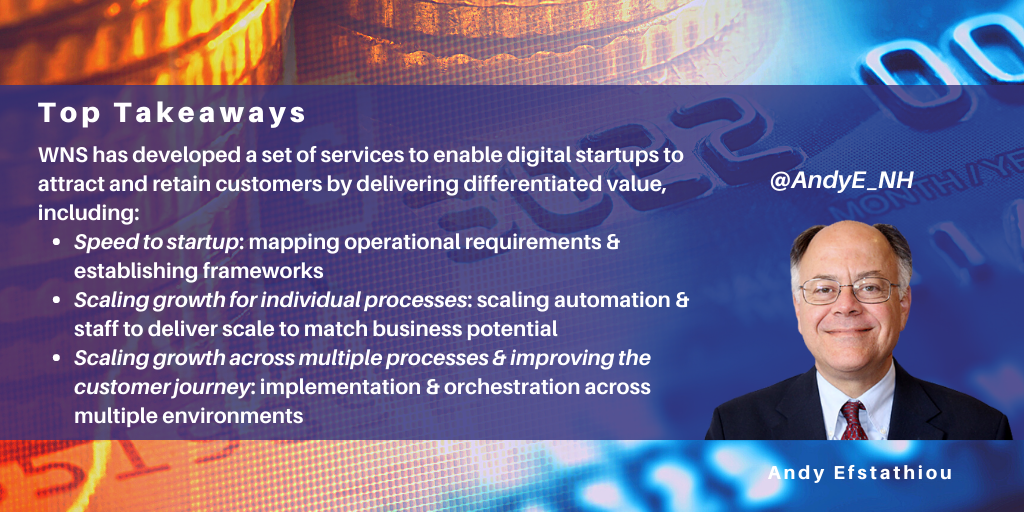Search posts by keywords:
Filter posts by author:
Related Reports
Related NEAT Reports
Other blog posts
posted on Aug 16, 2021 by Andy Efstathiou

Digital startup banks are built on FinTech functionality to deliver financial services in an omnichannel environment. There are two types of FinTechs: B2B businesses that have a proprietary platform to deliver service to clients, and B2C businesses that provide clients with an all-digital banking experience.
WNS: expanded focus on B2C FinTechs
While WNS supports B2B and B2C, it has seen more traction in the latter, and has expanded its services to support the B2C FinTechs. The key market segments include:
- Digital banks
- Personal finance
- Wealth managers
- Business finance (small businesses)
- Payment providers/digital wallets/crypto firms.
Because the B2C FinTechs work with consumers, they require support for compliance and customer support, and these processes require human interaction to succeed and grow. Only 10% of FinTechs survive, but successful firms require massive scaling to meet customer service requirements. The good news is digital banks have lower exception rates (typically a 3% exception rate, versus 10% from a typical tier one bank) because their core processes are all digital.
However, many of these startup digital banks have faced operational challenges. Traditional banks are retaining customers because they offer the entire range of banking services, at scale, which encourages customers to maintain their business with them. FinTech banks that have faced challenges include Tesco Bank which has sold off its mortgage business and is closing its clients' demand-deposit accounts. Similarly, M&S Bank, a JV of M&S Stores and HSBC, has closed its in-store branches and is also closing its customers’ demand-deposit accounts. The lesson is that full product-line operational delivery at scale economics is critical to success.
WNS services for startup FinTechs
WNS has pursued the startup B2C FinTech market with a three-pronged set of services:
- Speed to startup:
- Map regulatory requirements
- Identify volume and staffing requirements
- Establish controls and SOPs
- Establish risk management, compliance, and control frameworks
- Scaling growth for individual processes:
- Institutionalize best practices
- Scale staffing to match business potential
- Performance management
- Automate repetitive manual processes (e.g., exception management)
- Scaling growth across multiple processes and improving the customer journey:
- Scale multi-geography operations
- Incorporate new regulatory and process requirements into frameworks
- Implement IA, AI, and omnichannel CX.
WNS engagements with FinTechs add processes over time, and the typical progression of services includes:
- KYC/AML/Fraud and compliance: most engagements start with this set of processes
- CX and onboarding: engagements next add in compliant onboarding services to achieve higher conversion rates, faster overall growth rates, and improved CSAT
- Back office services: reporting, accounting, fulfillment.
WNS can enhance its clients’ capabilities with functionality from its own set of tools or its ecosystem of FinTech solution providers which delivers emerging functionality in four key areas:
- Customer service
- Origination and servicing
- Analytics
- Compliance.
By using this rollout strategy and set of offerings, WNS has been able to scale individual engagements by 2X to 10X in one year. Overall, WNS has been able to grow its digital startup bank business this past twelve months by 40% y/y. Clients using these services have experienced a 30% reduction in TAT, 95% improvement in CX, and 30% reduction in application processing times.
Conclusions
Digital startup financial institutions are looking to bring new business models to market quickly. Third-party services vendors need to provide STP and a comprehensive set of services to support these emerging BFS services providers. WNS has built a set of operational services which enable startup banks to scale fast and continuously deliver new functionality to customers. This enables digital startups to attract and retain customers by delivering differentiated value. In contrast, tier one banks look for vendors to deliver siloed functionality.
Startup banks need a vendor that can deliver broad operational support. Sourcing, organizing, and managing resources is a complex challenge for a bank. WNS has pulled together the relevant components and frameworks necessary to deliver a full-service operations environment. As startup banks and local banks look to grow their businesses, they will increasingly rely on third-party vendors for this type of support.
